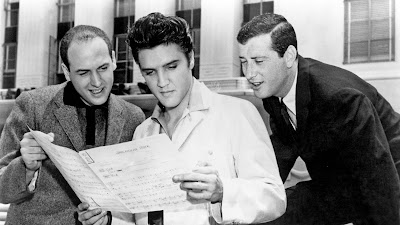I was inspired by a podcast called The 500 hosted by Los Angeles-based comedian Josh Adam Meyers. His goal, and mine, is to explore Rolling Stone Magazine's 2012 edition of The 500 Greatest Albums of All Time.
Album: #217
Album Title: Two Steps From The Blues
Artist: Bobby Bland
Genre: Blues, Soul-Blues
Recorded: Universal Recording Corporation (Chicago)
Released: January, 1961
My age at release: Not born
How familiar was I with it before this week: Not at all
My age at release: Not born
How familiar was I with it before this week: Not at all
Throughout my 29-year teaching career I have always coached teams and run intramural clubs. In fact, I began volunteering in 1984 at the helm of a bantam (13-14-year-olds) hockey team in my hometown of London. That experience prompted me to pursue teaching as a career. Mentorship is a powerfully rewarding pursuit. Not only does volunteering help build relationships with students, colleagues and parents, it has been scientifically proved to enhance happiness.
Psychologists have distilled the recipe for happiness to four keys (detailed above). Contributing to my community by mentoring, teaching and coaching gives my life additional meaning. The Japanese have a word that describes the achievement of occupational harmony -- Ikigai. Achieving Ikigai occurs when you secure a paid profession you love, are good at and is attentive to worldly needs. If I may be so bold as to imply that I have met these targets, I have achieved Ikigai and giving my time to the community simply adds to my joy.
 |
| An infographic on the four key components to happiness. |
 |
| The Japanese Venn Diagram for achieving Ikigai. |
This year, I coached the Sir Arthur Currie Volleyball team and recently held tryouts for the Slo-Pitch Club. Team tryouts are the only part of the process that I dislike. It is tough to tell hopeful 12- or 13-year-old kids they didn’t make the school team. It is a “gatekeeper” task I don’t like one bit.
It was a gatekeeper who played a significant role in the release of Two Steps From The Blues, the debut record from American singer and songwriter Bobby Bland. The gatekeeper in this case was Don Deadric Robey, the first African-American record mogul. Robey established Peacock Records in 1949, a decade before the legendary Berry Gordy created the Motown label in Detroit. Robey went on to take control of Duke Records, founded in Memphis, Tennessee.
It was a gatekeeper who played a significant role in the release of Two Steps From The Blues, the debut record from American singer and songwriter Bobby Bland. The gatekeeper in this case was Don Deadric Robey, the first African-American record mogul. Robey established Peacock Records in 1949, a decade before the legendary Berry Gordy created the Motown label in Detroit. Robey went on to take control of Duke Records, founded in Memphis, Tennessee.
 |
| Don Deadric Robey. |
 |
| Leiber (right) with his writing partner Mike Stoller (left) and Elvis Presley. |
At a time when African-American artists had few options when it came to signing a record deal, Robey, as head of Peacock/Duke Records, was able to leverage his position as "gatekeeper". Performers signed to his label were required to agree to exclusive booking and rapacious management contracts that allowed Robey to double and triple-dip on their performance income. Additionally, under the pseudonym Deadric Malone (generated from his middle name and his wife's maiden name) he gave himself songwriting credits to further profit through royalties.
Bland, who was illiterate with only a Grade 3 education, was easy pickings for Robey. Consequently, Robey's name or pseudonym appears in the songwriting credits for eight of the 12 tracks on Two Steps From The Blues. He is credited as the sole songwriter under the name of Deadric Malone for the record's biggest hit, I Pity The Fool.
 |
| Robey in studio, holding sheet music he, likely, claimed to have co-written. |
I Pity The Fool reached #1 on Billboard's R&B Chart in 1961 and made it to #43 on Billboard's Hot 100 Singles Chart later that year. It has been re-recorded by many artists, including by one of David Bowie's earliest bands, The Manish Boys -- at a time when he was still known by his birth name, David Jones. This version featured future Led Zeppelin musician Jimmy Page on guitar.
Music historians now believe that I Pity The Fool was likely written by American singer and songwriter Joe Medwick. Medwick is officially acknowledged with a few song-writing credits, However, it is believed (although not officially documented) that he wrote dozens more, many of which were surrendered to gatekeeper Robey for ready cash in lieu of royalties.
Bobby Bland continued to work for Robey and Duke records throughout the 1960s. In 1968, he and his band stopped touring due to financial pressures. He struggled with depression and alcoholism, but stopped drinking in 1971. At about the same time, Duke Records was sold to the larger ABC Record Company. The sale resulted in many of Bland's records being re-released and he benefited with a second chance at a performing and recording career overseen by more benevolent gatekeepers at the larger, more professional, ABC corporation.
Despite health issues, Bland continued to perform into his ‘80s. He died on June 23, 2013, at his home in Germantown, Tennessee, at the age of 83. Unlike Robey, Bland is celebrated for his achievements. He was inducted into the Blues Hall of Fame, the Rock and Roll Hall of Fame and the Memphis Music Hall of Fame. He received the Grammy Lifetime Achievement Award in 1997 and, in 2023, Rolling Stone ranked Bland at number 163 on its list of the 200 Greatest Singers of All Time. There is a statue of him in downtown Memphis.
 |
| The Manish Boys - Bowie is second from left. |
 |
| Singer-Songwriter Joe Medwick (c. 1950) |
 |
| I Take It On Home - Bobby Bland, on the ABC label |
Robey died of a heart attack in 1975. No one built a statue in his honour, which provides a lesson for us all... if you are, or become, a gatekeeper, do the job with respect and kindness.
.jpg)



No comments:
Post a Comment